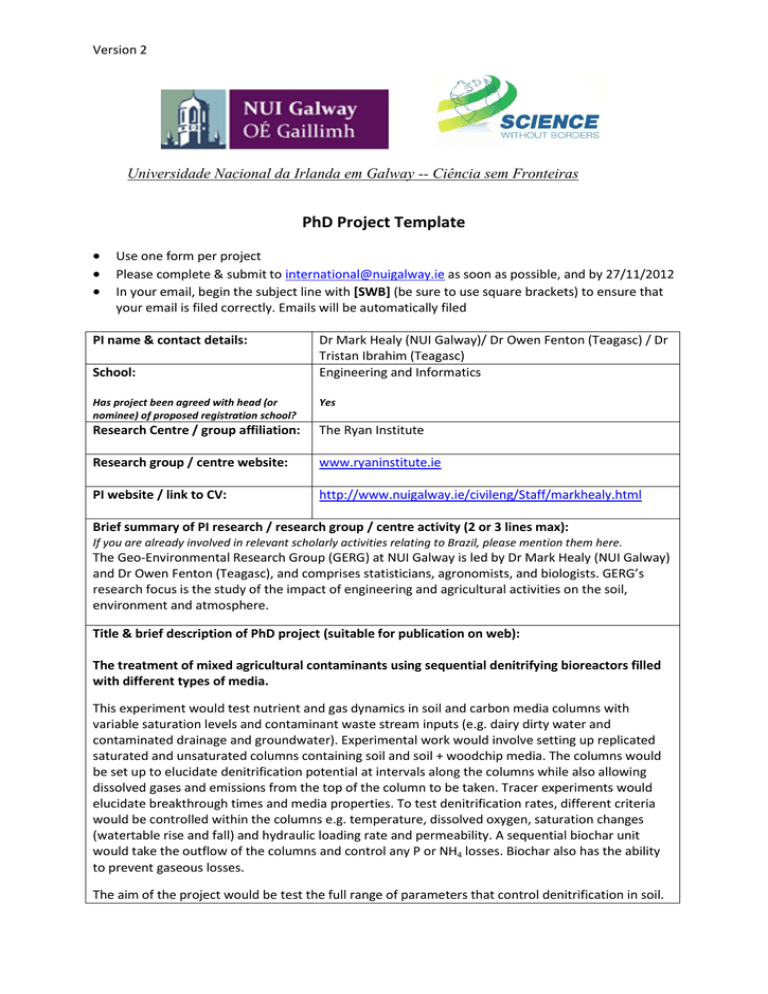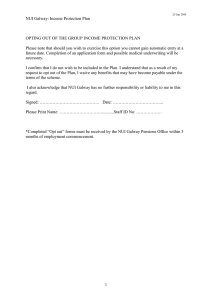PhD Project Template
advertisement

Version 2 Universidade Nacional da Irlanda em Galway -- Ciência sem Fronteiras PhD Project Template Use one form per project Please complete & submit to international@nuigalway.ie as soon as possible, and by 27/11/2012 In your email, begin the subject line with [SWB] (be sure to use square brackets) to ensure that your email is filed correctly. Emails will be automatically filed PI name & contact details: School: Dr Mark Healy (NUI Galway)/ Dr Owen Fenton (Teagasc) / Dr Tristan Ibrahim (Teagasc) Engineering and Informatics Has project been agreed with head (or nominee) of proposed registration school? Yes Research Centre / group affiliation: The Ryan Institute Research group / centre website: www.ryaninstitute.ie PI website / link to CV: http://www.nuigalway.ie/civileng/Staff/markhealy.html Brief summary of PI research / research group / centre activity (2 or 3 lines max): If you are already involved in relevant scholarly activities relating to Brazil, please mention them here. The Geo-Environmental Research Group (GERG) at NUI Galway is led by Dr Mark Healy (NUI Galway) and Dr Owen Fenton (Teagasc), and comprises statisticians, agronomists, and biologists. GERG’s research focus is the study of the impact of engineering and agricultural activities on the soil, environment and atmosphere. Title & brief description of PhD project (suitable for publication on web): The treatment of mixed agricultural contaminants using sequential denitrifying bioreactors filled with different types of media. This experiment would test nutrient and gas dynamics in soil and carbon media columns with variable saturation levels and contaminant waste stream inputs (e.g. dairy dirty water and contaminated drainage and groundwater). Experimental work would involve setting up replicated saturated and unsaturated columns containing soil and soil + woodchip media. The columns would be set up to elucidate denitrification potential at intervals along the columns while also allowing dissolved gases and emissions from the top of the column to be taken. Tracer experiments would elucidate breakthrough times and media properties. To test denitrification rates, different criteria would be controlled within the columns e.g. temperature, dissolved oxygen, saturation changes (watertable rise and fall) and hydraulic loading rate and permeability. A sequential biochar unit would take the outflow of the columns and control any P or NH4 losses. Biochar also has the ability to prevent gaseous losses. The aim of the project would be test the full range of parameters that control denitrification in soil. Version 2 Universidade Nacional da Irlanda em Galway -- Ciência sem Fronteiras Such ranges have been documented in the literature but are changing constantly as new research is conducted in different environments e.g. unsaturated zone. This laboratory scale experiment will be fully replicated and at the end of the full operation columns will be destructed and analysed for a variety of purposes e.g. microbiological and molecular analysis. In addition there would be an opportunity to work at a pilot scale bioreactor facility and field bioreactors within Teagasc research centres. Tasks involved: Working as part of a research team. Literature search. Design, construction and operation of the laboratory bioreactors. Testing of the bioreactors for a range of chemical parameters (N2/Ar, N2O, N2, CH4, COD, BOD, nitrogen, phosphorus, etc.). Analysis, synthesis, presentation and publication of results. Unique selling points of PhD project in NUI Galway: NUI Galway projects should emphasise features that are not typically available in Brazil – specific equipment, multi-disciplinarity, aspects of structured programme, links with industry, placements, links with other research groups etc. This project would allow the successful candidate the opportunity to work as part a multidisciplinary group within NUI Galway’s environmental engineering facility, which has links in Australia, USA, Finland, France, the UK, and Brazil. The Civil and Environmental Engineering Laboratory, constructed in 2011 at NUI Galway, is a state-of-the-art laboratory and is amongst the most pre-eminent laboratories of its type in Ireland. It is located in the largest engineering building in Ireland. The laboratory has state-of-the-art environmental water quality measurement, microbiological, and gas measurement facilities. GERG is also closely affiliated with Teagasc, Johnstown Castle, which is Ireland’s leading research institute on the rural environment, and which conducts both fundamental and applied research on a wide range of subjects, e.g. nutrient efficiency, water quality. Name & contact details for project queries, if different from PI named above: Please indicate the graduates of which disciplines that should apply: Graduates with a background in Civil/Environmental Engineering, or any natural science subject (geology, chemistry, hydrogeology) should apply. Training will be provided by the project supervisor. Ciência sem Fronteiras / Science Without Borders Priority Area: Please indicate the specific programme priority area under which the proposed PhD project fits- choose only one (tick box): Engineering and other technological areas x Please indicate which of the following applies to this project (referring to Science Without Borders arrangements): Suitable only as a Full PhD (Y/N): _ _Y___ Available to candidates seeking a Sandwich PhD arrangement (Y/N): _Y____ Suitable for either: __Y___

